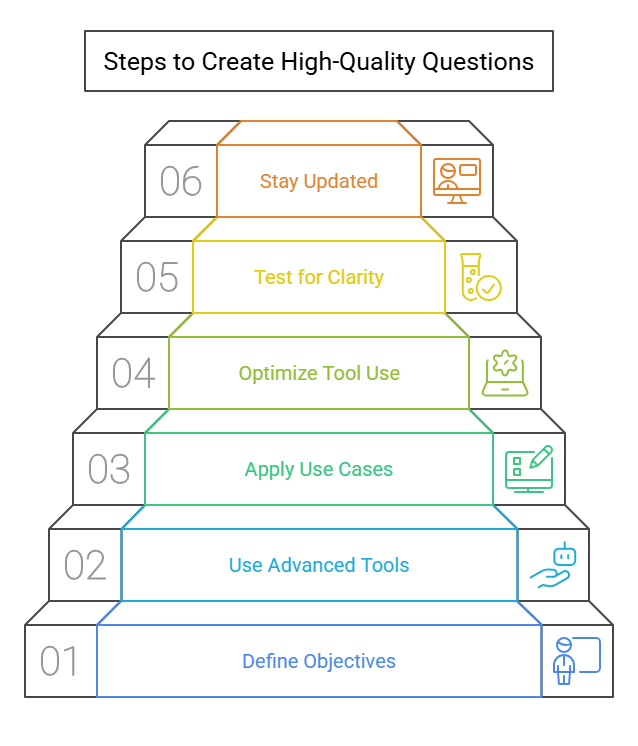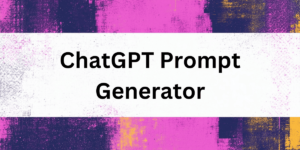Free Question Generator
How to use the neuroflash Question Generator


Type in ideas
Enter the topic that you want to write about or a short description in the text field. If necessary, you can select the desired writing style (e.g. serious or casual), length or language.
Generate text
Click on the “Generate” button and the neuroflash question generator will create a suitable text in seconds. Depending on the input, it can be a paragraph, a list or an entire article.
Edit text
Read through the generated text and adapt it according to your wishes. You can add content, reword it or remove unwanted parts. If the result doesn't suit you, you can simply regenerate the text.
Question Generator
🏆 Use Germany's leading AI content software
Generate on-brand AI texts and images for free every month! Including AI chatbot, 100+ prompt templates and more.
Table of contents
As our world grows more digital, educators, content creators, and marketers are constantly seeking smarter ways to work. One increasingly popular tool is the question generator—a resource that saves time and boosts productivity by crafting custom questions from any text. In this guide, we’ll break down what a question generator does, explore how it works, reveal the technology behind it, and share practical tips, templates, and real-world examples to help you make the most of it.
Key Takeaways: Question Generator
- AI question generators use advanced transformer models to automatically create high-quality questions from any input text.
- They easily integrate with learning management systems and other platforms, streamlining assessment workflows.
- These tools save educators valuable time by automating the tedious process of quiz and test creation.
- Built-in quality checks and personalization features help ensure the questions match different learning needs.
- Ethical and environmental considerations are crucial for responsible AI deployment in question generation.
- Ongoing innovations are making question generators more adaptive, context-aware, and aligned with ethical standards.
What Is a Question Generator?
A question generator is a software tool or online platform that automatically creates questions based on input text, documents, or content. These questions can range from simple factual inquiries to complex analytical or evaluative prompts. The goal is to automate the process of question creation, saving time and effort while ensuring a variety of question types are generated.

These tools are designed to:
- Create Assessments: Automatically generate multiple-choice, fill-in-the-blank, or open-ended questions for quizzes, exams, or surveys.
- Enhance Learning: Help educators develop formative and summative assessments, promoting deeper understanding and adaptive learning paths.
- Fuel Content Creation: Serve marketers and content creators by producing engaging FAQ sections or interactive content that addresses common queries.
How Does a Question Generator Work?
A question generator is an innovative tool that leverages advanced technologies to transform your text into engaging, targeted questions. Whether you’re an educator aiming to test comprehension or a marketer looking to boost audience engagement, an automated question generator streamlines the process by quickly converting content into a series of relevant questions.
At its core, a question generator analyzes provided content and identifies key ideas, facts, and concepts. Here’s a simplified workflow:
- Input Processing:
The tool accepts input in the form of text, PDFs, or even video transcripts. The text is pre-processed—cleaned, tokenized, and segmented—to prepare it for analysis. - Content Analysis:
Leveraging NLP techniques, the tool identifies important segments of the text. It can use methods like named entity recognition (NER) to spot proper nouns, dates, or concepts that may form the basis of a question. - Question Generation:
Using transformer models (like T5 or GPT) that are trained on large datasets (such as SQuAD, RACE, or CoQA), the tool generates question candidates. These models work by reframing tasks as sequence-to-sequence problems—taking an input sequence (e.g., a sentence or paragraph) and generating an output sequence in the form of a question. - Evaluation & Refinement:
Some advanced systems even include a second stage where generated questions are evaluated for relevance, grammatical quality, and difficulty. This step can involve additional models (like fine-tuned BERT evaluators) to filter out low-quality or irrelevant questions.

The Technology Behind Question Generators
Modern question generators are powered by a combination of cutting-edge AI and NLP technologies:
- Transformer Models:
Models such as T5 and GPT have revolutionized how machines understand and generate language. They work by learning complex language patterns from massive datasets and are capable of generating coherent and contextually relevant questions.
- Natural Language Processing (NLP):
Techniques like tokenization, syntactic parsing, and named entity recognition help break down text into manageable units, allowing the AI to identify key information that can be converted into questions.
- APIs and Cloud-Based Services:
Many question generators are accessible via web platforms or APIs. For instance, some tools are built on top of Google Cloud’s Vertex AI, which offers scalable solutions for deploying custom question-generation applications.
- Modular Frameworks:
Some advanced platforms use a modular approach where different components handle content extraction, question generation, and quality evaluation. This modularity not only improves accuracy but also offers flexibility to adapt the tool for various use cases—from education to research and content marketing.
Benefits of Using a Question Generator
Efficiency & Time Savings:
- Streamlined Workflows:
By automating the question creation process, educators and content creators can focus on refining content and engaging with their audience rather than spending hours writing questions manually. - Increased Productivity:
Whether you need a quick quiz for a classroom or a set of FAQs for your website, question generators help boost productivity by delivering high-quality output in a fraction of the time.
Improved Assessment Quality:
- Diverse Question Types:
From multiple-choice to open-ended questions, these tools offer a range of question formats that can cater to different assessment needs. - Adaptive Learning:
By generating a wide array of questions, these systems support adaptive learning environments where assessments are tailored to the learner’s level and progress.
Enhanced Content Engagement:
- Interactive Experiences:
For marketers and content creators, question generators can transform static content into interactive formats, increasing user engagement and dwell time. - Consistent Quality:
Leveraging advanced AI ensures that the generated questions are not only grammatically correct but also contextually relevant, making your assessments or content more impactful.

Key Benefits for Content Creators and Educators
A question generator is more than just an automation tool—it’s a powerful asset that can transform the way educators and content creators work.
Here’s a closer look at the advantages it brings to your creative and teaching processes:
1. Efficiency and Time-Saving
One of the standout benefits is the speed and efficiency it offers. Instead of manually crafting questions from scratch, the generator analyzes your text and produces a range of relevant questions in moments.
This rapid turnaround not only minimizes the time you spend on content creation but also frees you up to focus on other important tasks, such as refining your overall strategy or engaging with your audience.
- Streamlined Workflow: Automate repetitive tasks so that you can concentrate on higher-level creative or pedagogical activities.
- Quick Iterations: Easily generate multiple question sets for different sections of your content, enabling rapid revisions and updates as needed.
2. Enhanced Engagement and Deeper Comprehension
Quality questions are the backbone of interactive learning and engaging content. With a question generator, you can create thought-provoking queries that encourage your audience to think critically and interact more deeply with the material.
- Stimulating Interaction: By presenting well-crafted questions, you prompt your audience to reflect on the content, which can lead to richer discussions and more meaningful insights.
- Adaptive Learning: Tailor questions to different learning levels, ensuring that both beginners and advanced users find the material challenging and rewarding.
- Audience-Centered Design: Use questions to bridge gaps between complex ideas and clear understanding, ultimately enhancing the overall learning experience.
3. Versatility Across Various Applications
Whether you’re an educator developing assessments or a marketer crafting customer engagement strategies, question generators adapt to your unique needs.
- Academic and Training Materials: Create quizzes, review sheets, and discussion prompts that can be seamlessly integrated into lessons or training modules.
- Content Marketing and FAQs: Generate compelling questions for blog posts, social media content, or FAQ sections, helping to drive traffic and engage readers.
- Research and Surveys: Develop targeted questions for surveys or research studies, ensuring that each query is aligned with your specific objectives.
4. Leveraging Advanced Technology
At its core, a question generator relies on cutting-edge natural language processing (NLP) and machine learning algorithms. These technologies work behind the scenes to analyze text, identify key themes, and produce questions that are both grammatically sound and contextually accurate.
This sophisticated approach not only enhances productivity but also guarantees that the questions you generate are well-tailored to your content.
- Consistent Quality: Ensure every generated question meets a high standard of clarity and relevance.
- Continuous Improvement: Advanced algorithms learn and adapt over time, meaning that the quality of questions will improve as more feedback and data are incorporated.
- Scalability: Easily manage large volumes of content, making it a viable solution for organizations of any size.
Embracing this innovative technology not only saves you time but also elevates your content creation and educational practices, ultimately fostering a more interactive and dynamic learning environment.
Best Tips for Effective Question Generation: A Step-by-Step Guide

Creating high-quality questions is an art that can significantly boost engagement, learning, and critical thinking. Whether you’re an educator, content creator, or marketer, here are the best tips for generating questions that truly resonate with your audience.
1. Define Your Objectives and Analyze Your Content
Before you start generating questions, it’s crucial to understand your goal:
- Purpose: Determine if you’re testing comprehension, sparking discussion, or driving audience engagement.
- Audience: Tailor your questions to suit the needs of students, professionals, or general readers.
- Content Analysis: Identify key concepts, themes, and keywords. This deep dive ensures that every question connects directly with the core material.
2. Leverage Advanced Tools and Customize Settings
Modern question generators use natural language processing (NLP) and machine learning to streamline the process:
- Automation: Input your text and let the tool analyze and extract crucial points.
- Customization: Adjust parameters such as difficulty level, question type, and focus areas to match your objectives.
- Integration: Combine these tools with your LMS or content management platforms for a seamless workflow.
3. Use Cases, Tips, and Templates:
Educational Assessments-
Template for Multiple-Choice Questions:
Prompt: “Based on the text provided, which of the following best explains [concept]?”
💡 Tip: Provide clear options. Ensure that distractors (incorrect answers) are plausible yet distinctly different from the correct answer.
Example:
Text: “Paris is the capital of France.”
Generated Question: “Which city is the capital of France?”
Options: A) Berlin, B) Madrid, C) Paris, D) Rome
Using this template helps ensure that your assessments are both challenging and fair.
Research Question Formulation-
Using the PICOT Framework:
Prompt: “In [Population], does [Intervention] compared to [Comparator] improve [Outcome] over [Time]?”
💡 Tip: Clearly define each component to ensure the generated question is specific and researchable.
Example:
“In elderly patients (Population), does daily exercise (Intervention) compared to no exercise (Comparator) reduce blood pressure (Outcome) over 6 months (Time)?”
This method provides a structured approach, ideal for generating focused and actionable research questions.
Content Marketing & FAQ Generation-
FAQ Section for a Website:
Prompts:
“What are the key benefits of [product/service]?”
“How does [product/service] work?”
💡Tip: Use real customer queries and keyword research to tailor questions to your audience’s interests.
Example:
For an eco-friendly yoga mat: “What materials are used in eco-friendly yoga mats?”
This could lead to detailed responses on sustainability, durability, and maintenance tips, engaging potential customers by addressing their direct concerns.
4. Optimize Your Question Generator Use
Enhance your question creation process with these optimization tips:
- Review and Edit: Always scrutinize generated questions for clarity, accuracy, and relevance. Adjust the prompts as needed.
- Leverage User Feedback: Collect insights from learners or customers to continually refine and improve the quality of your questions.
- Integrate with Other Tools: Streamline your workflow by connecting question generators with LMS systems or other content management platforms.
- Experiment with Parameters: Test different settings like difficulty levels, question formats, and context lengths to determine what resonates best with your target audience.
5. Test for Clarity and Engagement
Before finalizing your content:
- Pilot Testing: Run your questions by a small sample of your target audience to gather feedback.
- Iterative Improvement: Use feedback to fine-tune the phrasing and structure of your questions, ensuring they are both clear and engaging.
Testing helps you identify any ambiguities and enhances the overall learning experience.
6. Stay Updated with Trends
The landscape of content and education is always evolving:
- Research Latest Tools: Keep an eye on emerging question generation technologies and methodologies.
- Incorporate Best Practices: Regularly update your approach based on current trends in digital learning and content marketing.
Staying current ensures your question generation remains relevant and impactful.
Conclusion
AI-powered question generators are transforming the landscape of education, corporate training, HR, and beyond. Their advanced technical architecture, seamless integration with various platforms, adaptive quality controls, and the promise of personalized assessments make them indispensable in today’s fast-paced digital environment. However, as with any transformative technology, it’s crucial to address the ethical, social, and environmental impacts associated with these tools.
By embracing emerging trends and implementing best practices, educators and businesses alike can harness the full potential of AI-driven question generation while upholding ethical standards and ensuring a positive impact on learning outcomes. The future of question generators is bright—provided we continue to balance innovation with thoughtful oversight and ethical responsibility.
FAQ

Are question generators useful for non-academic or non-training applications?
Yes—they can be used for market research, creating engaging customer surveys, HR interview preparation, and even content generation for digital marketing.
Do these tools support multiple languages or specialized jargon?
Some advanced question generators support multiple languages and can be fine-tuned for domain-specific terminology, although the quality might vary depending on the model and training data.
How long does it typically take to generate a set of questions from a given text?
Depending on the tool and the text’s length, generating a question set usually takes just a few seconds to a few minutes.
Use now for free - without sign-up

Creating content has never been easier -
Get started for free!
Keine Kreditkarte notwendig.








